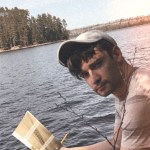“Artifact,” as Translated from Gluberhöff’s Lexicon
by Thomas Sorensen
Pronunciation: Brit. /ˈɑːtᵻfakt/, U.S. /ˈɑrdəˌfæk(t)/.1Gluberhöff recommends a brassy timbre and a gravitas like a bowling ball falling into a pit of chalk dust.
A. n.
1. An object that has fallen out of step with stillness.
2. A vicinity or locale where time has finally run itself clear.
3. Any still figure at mid-late evening, when the long shadows make even crumbs appear arranged like furniture.
4. The larval husk from which utilities emerge.
5.
a. A toy retrieved, slightly faded, from just-melted snow.
b. The cigarette butts of the recently deceased.
6. A fact unhandled for so long that presence has begun to thicken on its surface like a layer of moss.
7. A dead tree, esp. a tamarack.
8. The only surface upon which dew may justly be accused of trespassing.
1 Gluberhöff recommends a brassy timbre and a gravitas like a bowling ball falling into a pit of chalk dust.




